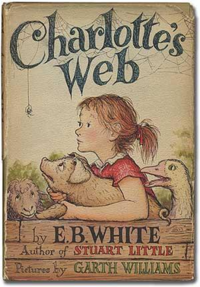
When I was a reporter at the Worcester (MA) Telegram & Gazette for many years, I kept three books on my desk. One was the Associated Press Stylebook, one was Strunk & White's Elements of Style and one was Charlotte's Web.
The first two might be pretty obvious for a reporter who loved to write, but the third? My reporter friends might say it was because I was an education writer and couldn't keep myself away from children and schools and libraries and books.
But the real reason was that the writing was so beautiful. When I needed to be inspired, I would pick up the novel and read paragraphs like this:
"The barn was pleasantly warm in winter when the animals spent most of their time indoors, and it was pleasantly cool in summer when the big doors stood wide open to the breeze. The barn had stalls on the main floor for the work horses, tie-ups on the main floor for the cows, a sheepfold down below for the sheep, a pigpen down below for Wilbur, and it was full of all sorts of things that you find in barns: ladders, grindstones, pitch forks, monkey wrenches, scythes, lawn mowers, snow shovels, ax handles, milk pails, water buckets, empty grain sacks, and rusty rat traps. It was the kind of barn that swallows like to build their nests in. It was the kind of barn that children liked to play in. And the whole thing was owned by Fern's uncle, Mr. Homer L. Zuckerman."
Don't you feel as if you are in that big beautiful barn? I know I do.
One thing that made White's writing so wonderful is he loved specifics. And he loved lists: "Templeton kept out of sight. In the tall grass behind the cattle barn he found a folded newspaper. Inside it were leftovers from somebody's lunch: a deviled ham sandwich, a piece of Swiss cheese, part of a hard-boiled egg, and the core of a wormy apple. The rat crawled in and ate everything. Then he tore a word out of the paper, rolled it up and started back to Wilbur's pen."
I was delighted to discover this book a while back at one of my favorite bookstores:
I think it is a goldmine for writers, because it lets us look over the shoulder of White as he worked his way through eight drafts of this amazing novel. It shows how "specificity is one of White's primary criteria for good writing."
Everything White writes is active; there are no wasted words.
I love this: "Artfully, White makes us feel the seemingly interminable rain as he begins four successive sentences identically - 'Rain fell...' - and then resolves the paragraph with a lovely, loose, sinuous sentence that winds its way as do the tired sheep."
"The next day was rainy and dark. Rain fell on the roof of the barn and dripped steadily from the eaves. Rain fell in the barnyard and ran in crooked courses down into the lane where thistles and pigweed grew. Rain spattered against Mrs. Zuckerman's kitchen windows and came gushing out of the downspouts. Rain fell on the backs of the sheep as they grazed in the meadow. When the sheep tired of standing in the rain, they walked slowly up the lane and into the fold."
And of course Charlotte's Web has one of the best first and last lines ever:
"Where's Papa going with that ax?"
And,
"It is not often that someone comes along who is a true friend and a good writer. Charlotte was both."
When I am reading the Annotated Charlotte's Web, I feel as if I am taking a writing class from a master. As The New York Times said in its review, "This book should be required reading for anyone who might still believe that it is easy to write for children."
Ha.
(Written with the help of my daughter, Laura.)

